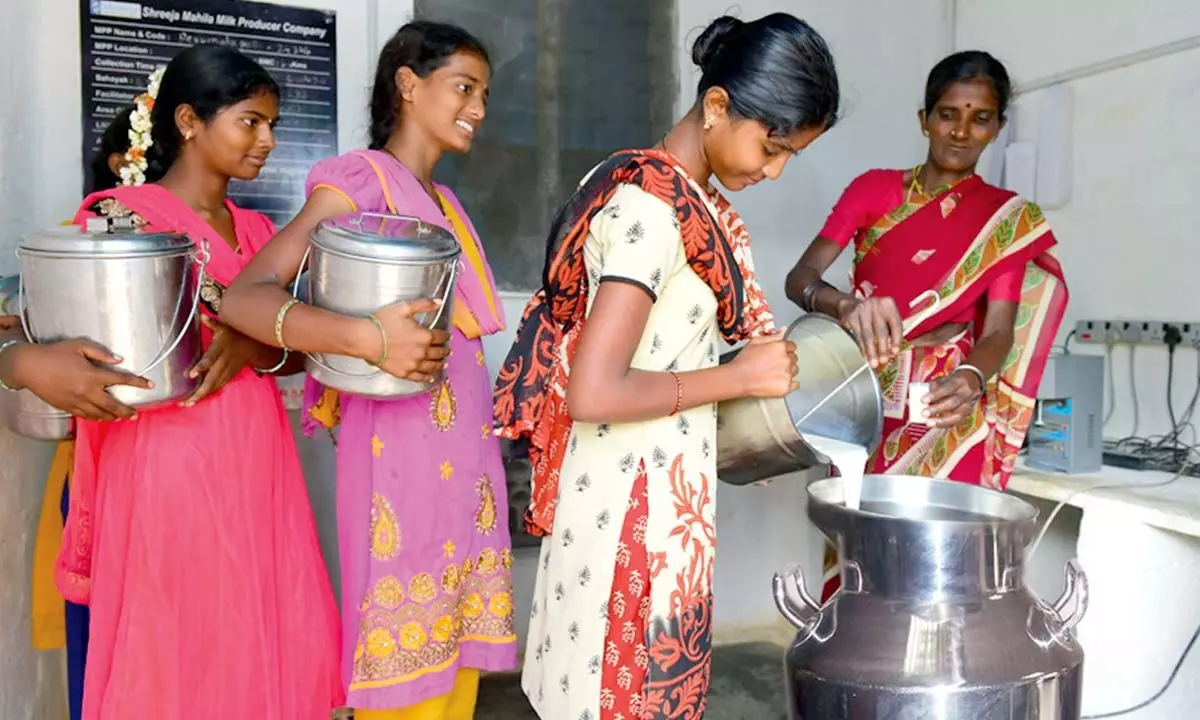How this women-led milk producer company empowering rural women
Started in 2014, Shreeja Mahila Milk Producer Company produces 6 lakh litres of milk per day. Its turnover in FY22 was Rs711 cr and net profit above Rs5 cr
image for illustrative purpose

The benefits have not just been economic but also social, Sreedevi says. With women owning and running the business, they also have financial muscle now. They are no longer dependent on menfolk for money, for it comes to their own account. There has also been a considerable decline in the incidence of wife-beating, she adds. Countrywomen are no longer helpless creatures
The word 'countrywoman' has a ring of derogation around it. About a decade ago, there was a news report, albeit unconfirmed, that the then Pakistan prime minister Nawaz Sharif had termed his Indian counterpart Manmohan Singh a 'dehati aurat' or a countrywoman, apparently implying a person with little education and less understanding about the ways of the world. The women running Shreeja Mahila Milk Producer Company Ltd, however, defy this myth.
Shreeja chairperson K Vijaya says that it is the world's largest only women-owned milk producer company. But it's a company that is run on co-operating principles. Headquartered at Tirupati, Andhra Pradesh, it began operations in September 2014.
"Our main objective is to procure, pool, process, and market milk to create maximum value for our shareholders and at the same time provide the best quality milk and milk products to the customers," Vijaya says.
She and her colleagues participated in the India International Dairy Expo which was held at the India Expo Centre & Mart in Greater Noida, Uttar Pradesh, during September 12-15.
Stakeholders from 40 countries participated in the event and showcased their wares and services. It was a typical trade fair, with stalls, formal inauguration, meetings, and conferences. The Shreeja stall, however, had a festive look and feel about it. Shreeja women would start an impromptu dance with lady visitors.
They have reasons to celebrate. Their company produces 6 lakh litres of milk per day. Its turnover in 2021-22 was Rs 711 crore and net profit above Rs 5 crore. The scenario was quite depressing before that, Shreeja chief executive Jayatheertha Chary informs Bizz Buzz. There was a co-operative in the area; it shut down in around 2005. There was a nexus, which was hurting people, the producers as well as the consumers.
A call was made to the legendary Verghese Kurien, the father of the co-operative movement in the country. It was because of his personal intervention that Sreeja came into being. It began as a women-owned and run entity, and has remained so. Women empowerment was given a concrete shape. The 15-person Shreeja board comprises 11 producer directors, three expert directors, and CEO Chary.
Shreeja's operations are spread over in districts of Andhra Pradesh and bordering villages of Karnataka and Tamil Nadu, covering about 1,600 revenue villages with a membership of about 1.06 lakh through 4,000 milk pooling points, producer director S Sreedevi said.
"Shreeja is also the End Implementing Agency or EIA for various projects implemented by Central government of India through the National Dairy Development Board," Sreedevi says, adding that these projects enable convergence of milk pooling and help improve animal nutrition, higher conception rates, and genetically improved animals in the same area.
The corporate structure of Shreeja, with 11 producer directors and professionals, has stood it in good stead. It has been able to harness capital, access markets, and get technology. "Business has grown, but basic co-operative principles of democratic governance and autonomy have not been compromised," Chary says.
The benefits have not just been economic but also social, Sreedevi says. With women owning and running the business, they also have financial muscle now. They are no longer dependent on menfolk for money, for it comes to their own account. There has also been a considerable decline in the incidence of wife-beating, she adds. Countrywomen are no longer helpless creatures.

